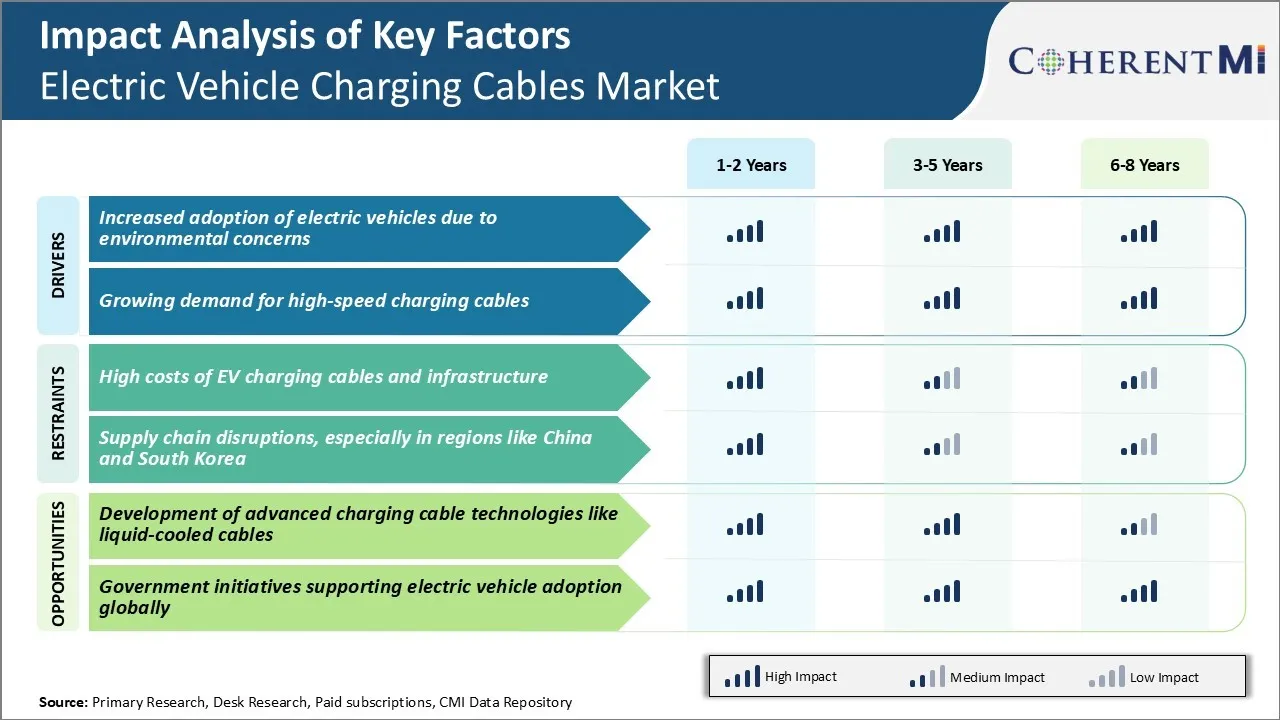Electric Vehicle Charging Cables Market Trends
Market Driver - Increased Adoption of Electric Vehicles due to Environmental Concerns
As awareness about global warming and environmental degradation is increasing across the world, people are increasingly adopting greener alternatives to curb pollution. The transportation sector is one of the major contributors to greenhouse gas (GHG) emissions.
According to surveys, many customers recognize the environmental benefits of electric vehicles (EVs) and want to contribute to the reduction of GHG emissions through their personal transportation choices. Rising fuel costs also encourage customers to switch from internal combustion engine (ICE) vehicles to energy-efficient EVs that save significantly on fuel costs in the long run.
This is fueling growth in the electric vehicle charging cables market as more charge points and charging stations need to be installed to provide sufficient fast charging options.
Market Driver - Growing Demand for High-speed Charging Cables
As EV adoption rates grow, there is an increasing need to develop high-powered fast charging infrastructure to support more EVs on roads and provide seamless, on-the-go charging options to customers. Long charging times associated with slow charging can negatively impact customer experience with EVs and act as a barrier for mass adoption.
Auto manufacturers are focusing on developing EVs with larger battery packs and improved driving ranges. However, longer charging periods could offset benefits of increased ranges. Similarly, increasing number of EVs will also require high-powered public charging stations to handle simultaneous fast charging of multiple vehicles. This is driving strong demand for next-generation high-power electric vehicle charging cables and stations capable of providing 60-350 kW rapid charges within 15-30 minutes.

Market Challenge - High Costs of Electric Vehicle Charging Cables and Infrastructure
One of the major challenges faced by the electric vehicle charging cables market is the high costs associated with establishing EV charging infrastructure and cables. Developing widespread public EV charging stations requires massive capital investments in advanced charging equipment, installation, and maintenance. The ultra-high power charging cables that can provide fastest charging speeds to EVs come with exorbitantly high price tags, making them unsuitable for large-scale consumer adoption currently.
Additionally, achieving economies of scale to bring down component and production costs will take time as the market is still in its early growth phase. High dependence on rare earth materials for components also keeps input costs elevated. Overcoming the financial hurdles is essential to accelerate EV adoption rates and the expansion of public fast-charging availability. This will eventually help in dealing with challenges in the electric vehicle charging cables market.
Market Opportunities - Development of Advanced Electric Vehicle Charging Cable Technologies like Liquid-cooled Cables
One of the prominent opportunities in the electric vehicle charging cables market is the development of more advanced cable technologies that can help overcome challenges related to costs and speeds. For example, research and commercialization of liquid-cooled electric vehicle charging cables hold great promise.
By circulating a cooling liquid inside the cable jacket, liquid-cooled designs can potentially handle much higher power densities compared to air-cooled electric vehicle charging cables. This allows faster charging without risking overheating or reduced lifespan due to thermal stresses.
Liquid-cooled electric vehicle charging cables with larger copper or aluminum conductor cross-sections can transfer more power over longer distances as well. Mass production of such cables at competitive prices through innovative manufacturing methods can support next-generation ultra-fast public chargers capable of fulfilling 80% battery charges within 15 minutes or less. Achieving such fast charging experiences for consumers through improved cable technologies can significantly boost future prospects of the electric vehicle charging cables market.